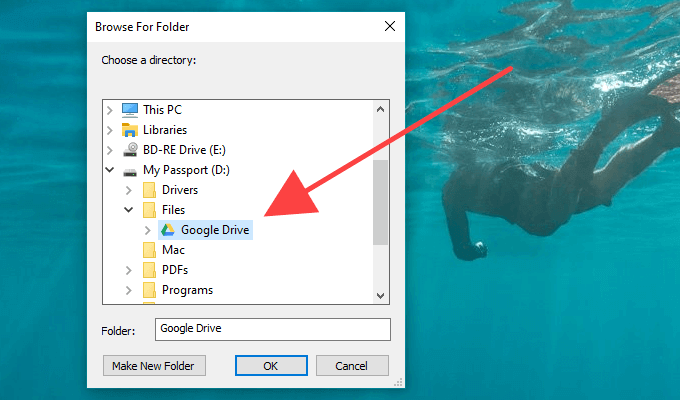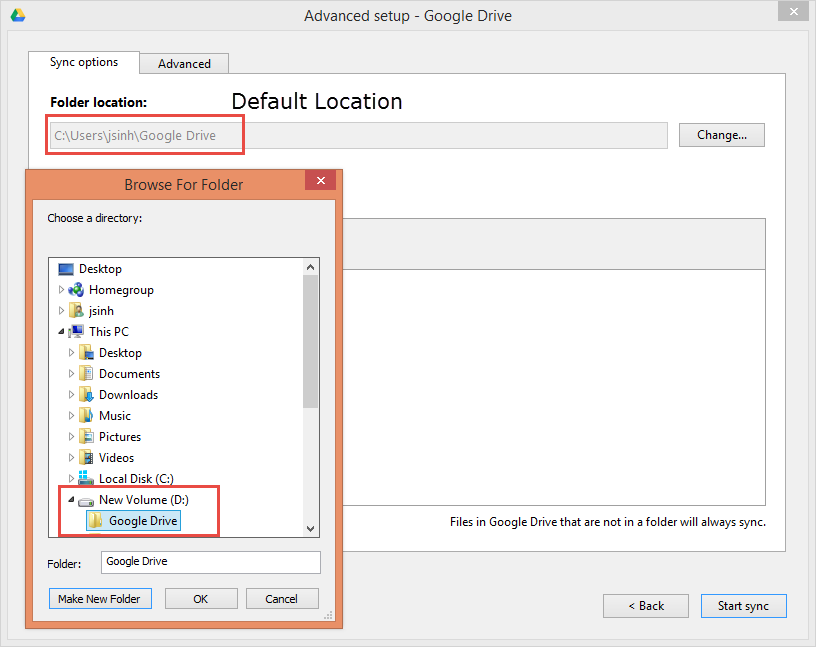

Hackers could exploit vulnerabilities in Google Drive to inject malicious files by disguising them as legitimate documents. Ransomware: According to SonicWall’s 2021 Cyber Threat Report, ransomware attacks have increased a record 148% globally.Google users, both individuals as well as businesses, were unable to send emails or upload files as a result of the hours-long service disruption. Unanticipated outages: In 2020, Google suffered a major outage that impacted several of its services.They have access to your company’s systems and data, which they can exploit to expose, steal or destroy vital information. Because these threats originate from within the organization, they are often harder to detect. Malicious insiders: Disgruntled employees pose a serious threat to businesses of all sizes.
#Move google drive folder backup and sync free#
Your employees could accidentally delete important files or the original copy of a file while trying to free up storage space or remove duplicates. Human error: According to Verizon’s 2022 Data Breach Investigations Report, more than 80% of data breaches involved the human element, including social attacks, errors and misuse.Let’s take a closer look at some of the top reasons to back up Google Drive: Besides cyberthreats, there are several other security risks that could result in Google Drive data loss. Even though Google’s data centers are highly secure, today’s advanced cyberattacks are known to penetrate even the strongest defense systems. While Google is responsible for application uptime and availability, you are operationally and contractually liable for data protection.

It is not uncommon for Google Drive users to assume that by storing data online, their documents and files are automatically backed up. In rare cases, Google will use backups to restore data in order to maintain high levels of reliability. Google even guarantees 99.9% application uptime and financially compensates its customers for mistakes on their end. This ensures your Drive files and folders will be up and running in no time, even if disasters do strike. Google maintains backups of primary data for disaster recovery and business continuity purposes - for example, hardware failure, data center outage, or natural disasters like earthquake, hurricane and so on. Google Drive is a great alternative to physical onsite storage systems. Your business must consider implementing Google Drive if storage needs are growing significantly. This online service helps free up storage space on your devices by hosting data in the cloud. Google Drive is a cloud storage solution that allows you to store files in the cloud and access them from any device with an internet connection. By syncing your documents, files or folders on your computer with Google Drive, any changes you make to those files and folders will be automatically updated in the cloud versions as well. Your data stored on Drive is encrypted both while in-transit and at-rest. When you upload files and folders to Google Drive, they are stored securely in Google’s data centers located across the globe.

You can access Google Drive using Google Drive for Desktop or through its web application, or using the mobile app. Google Workspace plans for businesses start at $6 per user, per month, which includes 30GB of cloud storage per user. Google offers 15GB of free storage service to its users.

Google Drive is a part of Google Workspace that includes a host of productivity and collaboration tools for businesses of all sizes. You can also sync files on your computer with Google Drive and access them anytime, anywhere and from just about any device - desktop, laptop, tablet or smartphone. The hosted files can be viewed, edited and shared with team members for seamless real-time collaboration. You can upload documents, images, audio and videos to private or shared folders in Google Drive. Google Drive is a storage service from Google that enables you to store files and folders online.


 0 kommentar(er)
0 kommentar(er)
